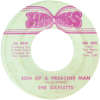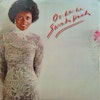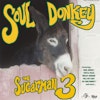In 1969, Dusty Springfield’s “Son of a Preacher Man” bludgeoned music charts internationally. For years after, new versions came from different regions and languages, revised as country pop and a German ballad (eventually being sampled famously by rap producers). The story of Billy Ray and his father suffered such diminution that even Aretha Franklin’s early take, released in 1970, came and went as a fleeting B-side.
The Gayletts’ version steered clear of duplication and changed the tone completely. The sexiness of the original is replaced by a sense of angst and puppy-love blues. If Dusty’s sultry approach was that of a learned woman, the Gayletts were the shy girls in class. Aesthetically, it’s much more light, but that lightness is central to its effect.
The Gayletts were originally the trio of Beryl Lawson, Merle Clemonson, and Dawn Hanchard, but re-formed in 1967 with Judy Mowatt replacing Hanchard. Common for Jamaican releases of the time, their name was feverishly misspelled, shown on different labels as the Gaylettes, Gaylets, and Gayeletts. The ladies disbanded when Lawson and Clemonson left for America in the early ’70s.
Judy Mowatt remained, joining Rita Marley and Marcia Griffiths as Bob Marley’s famous backup singers, the I Threes. Mowatt continued her own work for quite some time, but it’s this recording—and a couple of early Gayletts singles—where she really shines. Her delicate voice and shaky delivery perfectly serve the horns, which are less of a centerpiece in this version. This isn’t tepid like some other famous attempts, notably by Nancy Sinatra, Tina Turner, and French pop chanteuse Nicoletta, all of whom were absolute stunners but seemed to go on autopilot when they recorded their versions.
“Son of a Preacher Man” was one of Dusty Springfield’s career-defining songs. Beryl Lawson and Merle Clemonson seemingly never recorded again, and Marcia Griffiths and Rita Marley each had success to varying degrees years later. And Mowatt, whose vocals usher everything along, released a handful of solo albums, including 1975’s Mellow Mood and 1980’s Black Woman. What’s heard on this pink and green 45 is one of the most endearing covers of one of the best singles ever made.


